Monsters & Mommis is a five-week miniseries celebrating queer horror. It’s Halloween month, so let’s plan our costumes, get slutty, and, of course, watch some scary movies. This week, Juliana Rojas and Marco Dutra’s Good Manners (2017) starring Isabél Zuaa and Marjorie Estiano.
Two years ago, I slipped an oval of estrogen under my tongue for the third time. I felt the transformation within me, my veins coursing with placebo. I knew there wouldn’t be any effects for weeks, if not months, but change was coming. I could literally taste it.
Two days later, I dressed up for Halloween. I went with my girlfriend and some friends to a queer dance party and drank too much in the most pleasant of ways. The next day I posted pictures from the evening. It was my first time posting pictures in six months, my online coming out.
Four weeks later, I decided that I was never going to have biological children.
Before my parents had even accepted the reality of my transition, they begged me to freeze my sperm. I’d been out to them for less than a month, on hormones for a couple of weeks, and having children was not at the forefront of my concerns. I silenced them with my current understanding. If I ever wanted children, or was about to have surgery and thought I might want children, I could go off estrogen for a couple weeks without a problem.
During my one-month check-in my doctor explained that it wouldn’t be so easy. I’d have to go off hormones for months to ensure healthy sperm and the effects of the resurgence of testosterone might be traumatic. She highly recommended if I wanted biological children that I stop my new treatment for a month, and freeze my sperm now.
I wasn’t sure if I wanted children at all, let alone biological ones. But I also didn’t want to have to make this decision at 23 in the middle of the most dramatic period of my life.
Besides my reluctance to stop HRT, I simply couldn’t afford to freeze my sperm. I knew my parents would offer to help, but I didn’t want them involved in my choice to someday have or not have children. The decision became clear. I would never have biological children. I would never see my cute baby pictures and my girlfriend’s cute baby pictures in a single face. I would never have the ease of family building bestowed upon so many straight cis couples.
I spent the next several weeks crying on the subway whenever I saw a child. I cried because I was suddenly full of estrogen. I cried because I’d said goodbye to a certain type of family. I cried because my actual desire was never even available to me. It wasn’t about lost sperm. It was about a phantom uterus that lived only in my dreams.
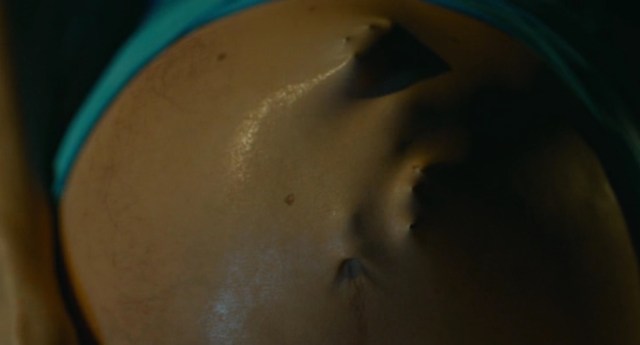
Missing out on all the fun
Good Manners is a lesbian werewolf fairy tale horror movie musical and it has as many thematic threads as it does genres. It’s about race and class divides in Brazil. And it’s about queer motherhood.
There’s something supernatural and vulnerable about motherhood that’s made it a tenant of horror cinema. Films like Rosemary’s Baby, The Fly, Prevenge, and, in a more abstract sense, Alien use pregnancy itself as a source of terror. Women lose control of the self, sharing their bodies with something less than human.
Then there is a whole separate group of horror movies about parenting. The Babadook, Bunny Lake is Missing, Goodnight Mommy, and The Others all explore a feeling of feminine inadequacy, a fear of failing one’s child either out of neglect or hatred. Literally or metaphorically, these mothers must confront the lack of a maternal instinct.
All these films have heterosexual protagonists, but Good Manners isn’t the first film to shift the narrative to a queer mother. Stewart Thorndike’s 2014 film Lyle starring Gaby Hoffman and Ingrid Jungermann is a queer take on Rosemary’s Baby. It’s an effective and frightening film, but ingrained in its conceit is a commitment to normative structures. The film asks whether the tale of a pregnant woman unable to trust her partner is changed when the partner shifts from man to butch woman. It’s certainly a queer film, but the alignment with Hoffmann’s character, the half of the couple that’s carrying the baby, makes it very similar to the heterosexual films listed above. In a sense, that’s the entire point.
Good Manners, however, is exploring something uniquely queer. Part of the reason it’s such an overwhelming and complex film is because its queerness forces it to embody both the body horror of pregnancy and the fear of parental failure, while also including the distrust of adoption found in something like The Omen and the rejection of an other found in works like Frankenstein and Freaks.
If the idea of having children as queer women is a fraught and complicated topic, Good Manners opens itself up to the mess, the devastating, beautiful mess.
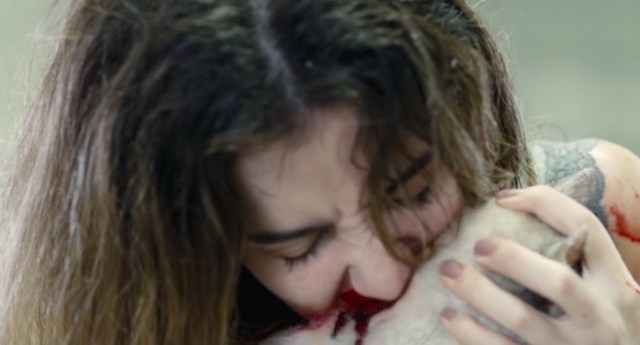
Hormones cause all sorts of cravings
Good Manners begins with a pregnant woman making a mistake. Ana double-booked nanny interviews and she asks Clara to wait. The prospective mother and prospective nanny are opposite people. Ana is loud, Clara is quiet. Ana is white, Clara is black. Ana is high femme, Clara is not. Ana has an air of entitlement, Clara is just trying to make ends meet.
The first nanny Ana meets with has far more experience. She explains to Ana her exact method for childrearing. And then she mentions a desire to speak to Ana’s husband. This nanny is used to a heteronormative household, where mothers and fathers act according to society’s rules. The 29-year-old queer and single Ana knows this won’t work.
Clara, on the other hand, has never had a job like this before. Her background is in nursing. During the interview, Ana experiences a sharp pain and Clara is able to help it subside. She stands behind her, hands softly on her arms, firmly on her back. Her touch is intimate. Ana breathes. And the pain disappears. Clara is hired.
Even before anything out of the ordinary occurs, Ana is not an average mother to be. Recently disowned by her wealthy family, she still hasn’t adjusted to independence. She begins to rely on Clara as a housekeeper, yes, but in some ways more as a mother and a partner. She expects her to do all the shopping and the cleaning and put together furniture for the baby and provide emotional support, seemingly unaware of the scope of her demands. But Clara needs the money. And it doesn’t hurt that Ana happens to be extremely attractive.
They grow closer and more isolated from the outside world. They dance together on Ana’s birthday. They hold hands at a doctor’s appointment. Clara gifts Ana a baby naming book. Ana opens up about her pregnancy and her family and Clara gives sage queer wisdom: “You don’t have to mind what people think and say. Fuck ‘em.”
Clara tries to maintain boundaries. She decides to leave Clara alone and go out to a bar. She even gets a number written on a napkin with a lipstick kiss. But upon returning home she falls back in deep.
Ana is rummaging through the fridge, lit by the full moon. Clara approaches and Ana begins to smell her. She runs her hands all over Clara. She grips her arms. She keeps smelling, face buried into Clara’s skin. She licks the top of her chest. She bites her shoulder. She licks her mouth. Their lips meet in intensity, tongues entangled. And then Ana bites her lip.
Clara pulls away, dabbing her bloodied mouth. Ana stands in front of her rabid, eyes burning orange.
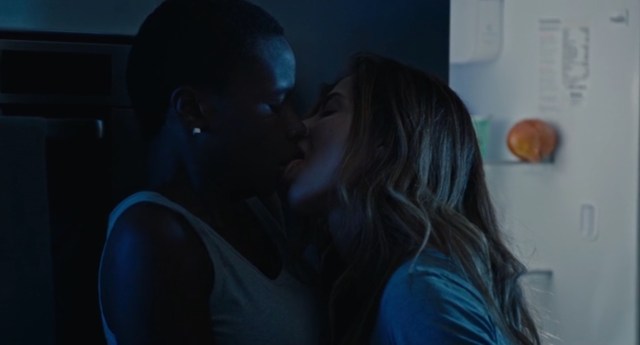
She can bite me all she wants
Clara begins keeping track of Ana’s “sleepwalking,” noting it only happens on nights when there’s a full moon. Nobody thinks werewolf. Clara and Ana are queer women and they respect the power of the moon.
Ana wakes up from an anxious nightmare and Clara comforts her. She gives her a massage that leads to a kiss. Ana grabs Clara’s hand and puts it on her breast. This time she’s wide awake. She knows what she’s doing.
They lie down on the bed, shirts off. Clara kisses down Ana’s belly, and doesn’t stop. She makes her cum. Then Ana lies on top of Clara, behind her, the unborn child between them. She makes Clara cum, and, more significantly, she makes her smile. Their partnership is consummated.
There is nothing grotesque about this moment. The ever-creeping sense of terror ceases. Ana and Clara are allowed to find comfort and connection in one another. It’s sexy. Ana is sexy. Her pregnancy is sexy.
But it’s less sexy a few hours later when she sleepwalks out into the world and devours a stray cat.
Clara tells Ana about the sleepwalking. She spares her the details, but Ana is still a wreck. She’s terrified for the safety of her child. She’s terrified that her family was right. She tells Clara the story of the one-night-stand that led to the pregnancy, and she clings to Clara more and more, trying to shape her into a traditional partner. Ana wants to be a good mother. She just doesn’t know what that means separate from conventional social structures.
Ana is proudly herself. She defied her family and mocks the titular as boas maneiras they tried to instill in her. But just because someone has the courage to be different, doesn’t mean those expectations aren’t still internalized.
I’m proudly queer, happily trans, determined to never again live in the suburbs. And yet, I feel such a deep sadness when I think about how I’ll never be a dad playing catch with his son. No matter my actual values, part of me still equates parenthood with the missed opportunities of “Cat’s in the Cradle.”
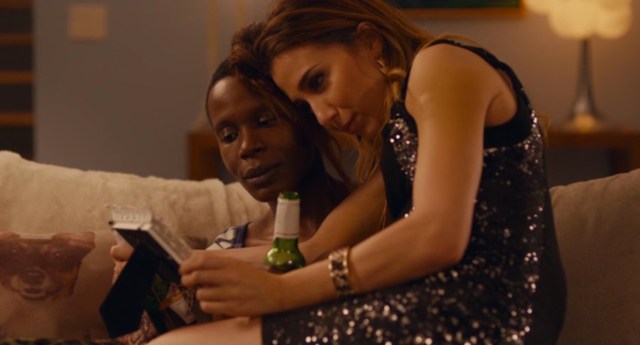
No matter gay, straight, or bi, lesbian, transgender life, you probably shouldn’t drink when pregnant
Ana will never be a parent.
A craving for pine nuts sends the dutiful Clara out into the night at the worst possible time. Ana is struck by a sudden pain. She screams in horror. She’s terrified for her child, for herself.
There’s a reason babies aren’t supposed to have claws.
Her darling little wolf baby, umbilical cord around his neck, tears through her abdomen, leaving Ana open and dead. Clara arrives home to the horrifying sight and grabs Ana’s gun. The child has scurried into the corner, wheezing and angry.
An instinct hits Clara. She can’t shoot. She approaches the child and unwraps the cord. Hairy and fierce, he’s still just a baby. He didn’t mean to do what he did. Clara quickly packs up and leaves. The movie turns into a musical, a homeless woman on the side of the road sings a song of warning to Clara.
“That child had better/Not cry/Hold it tight against you/As you cross to the other side/Walk steadily/And fear won’t be there/Don’t ever look back/That’s the advice we share”
But Clara does look back. She tries to leave the child by the river, but his cries won’t let her. Maybe it’s her love for Ana, or maybe it’s a maternal instinct buried deep within. She holds the child on the train and she begins to cry. She cries for Ana, she cries for the child, she cries for herself. She sings.
“What life holds in store/I still have no clue/But tonight/Under the rain/There’s only the two of us left/I will protect you”
Clara unties her shirt. She gives the crying baby her breast. She isn’t lactating, of course. But she gives him what she can. She gives him her blood. He bites and he sucks.
Clara becomes a mother.
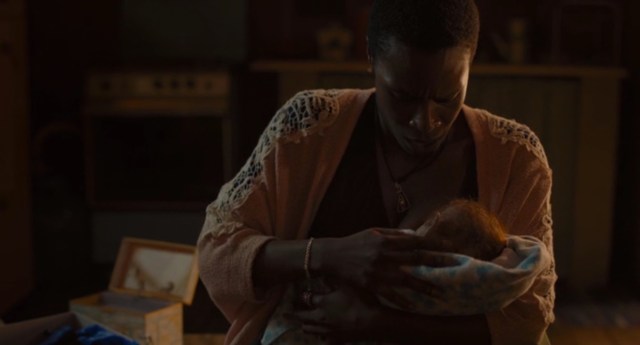
First there was soy, then almond, then oat, now…
Seven years later, Joel is all grown up. Slightly malnourished and struggling in school, the secret wolf boy is clearly feeling the effects of his difference.
But Clara is doing the best she can. She’s holding Joel to a strict vegetarian diet and every month during the full moon she has him sleep in the “little bedroom,” his arms shackled to the wall. The next morning, she gives him a bath. She shaves the coarse body hair that grew in the night and trims his claws.
Joel’s friends Maurício and Amanda don’t understand why Joel’s mom is so strict or why he seems to always get sick once a month. The other parents and teachers and Clara’s landlady Dona Amélia are also suspicious. This has less to do with Clara’s parenting than it does her obvious difference. Nobody knows Joel is a werewolf, but they know he’s not black. They know he’s adopted.
Joel is the sweetest little boy. He longs for normalcy, but he loves his mother. He trusts her. Despite his young age, he understands the necessity of the little bedroom. He understands that it’s painful for both of them. While he’s hidden away and locked up, Clara lies in bed, staring at a picture of his real mother.
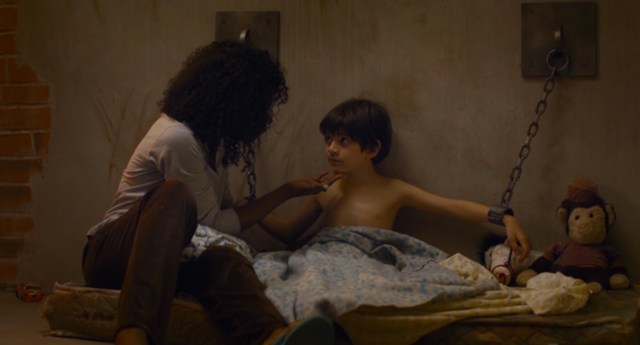
“The least you could do is read me a bedtime story.”
Dona Amélia cooks Joel a steak and the routine is broken. The meat causes a turn. He finds the picture of Ana and confronts Clara. “Who is she?” he asks angrily. “I look like her, just like Maurício looks like his father!” He screams and calls her a liar. She tries to get him to go to the little bedroom and he refuses. “You’re not my mother!” he says as he begins to transform. She locks him up but not before he gives her a deep scratch on her arm.
The next morning, he’s still angry. “Everything I do, I do it to protect you,” she tells him. He asks about his mother, and she describes her lost love. He asks about his father, and she truthfully tells him she knows nothing.
Joel isn’t satisfied. That night he’ll go looking for his father, staying out long past sunset, transforming in the moonlight. He’ll take an innocent life.
It’s especially painful that his desire for a father is what leads to this tragedy. It must be hard raising a child without a man in our heteronormative world. It must be even harder when that child is a boy. Clara has tried her best, but there’s a distance between her and her son. She has become his mom. But she’s definitely not his dad.
The next day, Joel returns home, and Dona Amélia sees him in his true state. Before she can call a priest, Clara stabs her with a sedative. She quickly packs up, ready to flee. But Joel refuses. Instead he tricks her, locking her in the little bedroom.
He just wants to be normal. He just wants to go to school and attend the festival that evening. He just wants to eat the food everyone else eats. He just wants a mom and dad who look like him, just like all the other kids.
But he can’t have any of this. At the festival he begins to turn. Clara, finally free, arrives just as he’s about to kill again. She shoots her son in the leg.
She quickly takes him home. She locks him up and removes the bullet. Outside the little bedroom, she can hear an angry mob forming. Everyone knows. And they want her son dead.
Joel is still in wolf form. Clara tries to touch his nose and he bites at her. She begins singing to him and he lets her touch his head. Her neighbors bang at the door. She undoes his chains. They both get up and she reaches out her hand. He takes it. They stand together, mother and son, ready to face the world.

What to expect when you’re expecting
If horror is meant to reflect and heighten the fears deep within our souls, Good Manners manages to take every anxiety I have about someday being a parent and turn them into a series of healing nightmares. The same way Rosemary’s Baby may appeal to a cishet woman nervous about carrying a child, this film appeals to me as a queer trans woman who never will.
Even though I’m many years away from any possible motherhood, having already made decisions around my reproductive future has made it a lingering presence in my life. I think a lot about myself as a parent, even if I’m still not sure it’s something I want or if it will even be possible for me. I know some cis queer women and non-binary people know they’d never want to carry a child. Maybe their experience of the film is similar to mine. A haunting familiarity hidden within this fantastic speculative future.
I didn’t tell my parents about my doctor’s appointment. I didn’t tell them about my decision. They continued to talk to me about freezing my sperm, correctly unsatisfied with my glib and inaccurate explanation. I humored them, nodding along, telling them I’d ask my doctor at my next appointment. They were still coming to terms with my transition and they focused in on this one tangible thing. If they couldn’t keep their son, they could at least make sure he didn’t give up this last bit of normalcy.
A couple months later, sitting in the passenger seat of my dad’s car, I told him the truth. I told him that I couldn’t involve my parents in the choice to someday have children. I told him that it was complicated for me as a trans lesbian to have this genetic material to offer in the first place. I said all of this in a measured tone, trying my best not to cry.
He listened. He seemed to understand. But he hoped someday I’d still find a way to have children. He paused, searching for the words, mulling over how they’d feel. “I think you’ll be a really good mother,” he said. I let myself cry and he cried too, sitting next to the daughter he never could have expected, and never could have prepared for.
The truth is I don’t know if I’d be a good mother. Certainly at 25 I wouldn’t be. How would I not pass along my anxiety? How would I learn to be less controlling? How would I protect them in a world that hates me?
I don’t know if I’d be a good mother, but if that day ever comes, I know I’d try my best. I know I’d love that wolf baby as much as I possibly could.
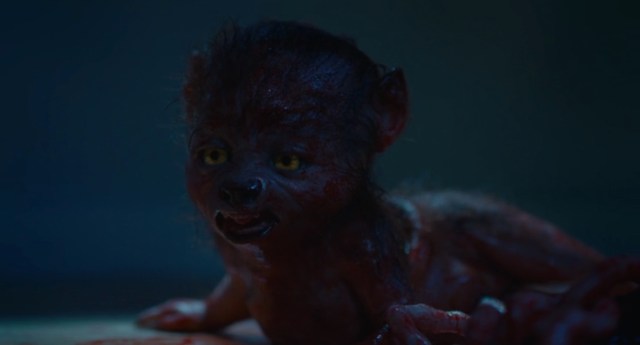
What life holds in store/I still have no clue/But tonight/Under the rain/There’s only the two of us left/I will protect you



I didn’t expect to cry from a horror movie review, yet here we are.
<3
Same!
Seconded. Or thirded? Whichever. I was also unexpectedly tearing up while reading this.
This is one of the best film review as personal narratives I’ve ever read. Thanks Drew!
Also, the movie sounds good. I did read the title as “An Edwardian Comedy of Manners with Lesbian Werewolves” and that also sounds like a good, but different, movie.
Thinking about kids though…. I never wanted kids. As a child I knew I’d never be a parent. I got sterilized as soon as I could with zero regrets. But I feel you on that first hit of Estrogen. The real effect was probably from the spiro blocking all the T, but I just felt so good so fast. I felt RIGHT. Just wish I’d gotten started on it a lot sooner.
Thank you! And yeah those first weeks are so exciting.
I don’t like scary movies and won’t be watching this one, but I appreciate getting to read about it and your thoughts on parenting. My wife did bank her gametes and we tried to make a baby but it didn’t work. Now we have a house full of shared kiddos from hard places, and I love them, I am grateful that they are in my life and I get to do parenting.
We have one more possible try at making a baby but I don’t know.
I’m not a fan of modern horror because I’m too much of a wimp, but I really enjoyed this film! Just wanted to mention that in case you were thinking about trying it. It really is worth the watch. But obviously, if you are already sure, never mind! Not trying to pressure anyone – just offering my perspective as someone who normally hates horror because of gore and jump scares.
Wow, this hit me right in the feels. I _did_ bank sperm before I transitioned, but recently my wife told me she wasn’t interested in having kids (though she did acknowledge that, since we’re poly, she had no problem with me having kids with someone _else_, as long as she didn’t have to be the primary caregiver).
Needless to say, I still have a lot of feelings about that, too. Glad to know I’m not the only one who’s in a strange situation that society has no script for.
That whole thing in the UK with the trans dude having a kid and the courts throwing out the entire damn WORLD just to try to preserve some linguistic fuckery – can we not do that
Thank you for writing this. There is so little writing on how hard this question is for queer women, in a way that you articulated beautifully. Ethical questions and questions of selfhood come up for me in ways I rarely see grappled with in mainstream narratives. I’m definitely going to watch this now.
This film fucks me up from very different angle.
One of the reasons I don’t think parenthood is in the cards for me other than biology issues is a fear the urge to keep them safe would lead to harm.
Cause when bad things happen to a person when they’re a little kid it can lead having protective instincts that aren’t quite right and come with an intensity that’s probably not healthy.
Would I smother a child, or be so permissive I make an entitled little monster?
I really don’t want to find out.
Such a poignant review. Thank you.
<3